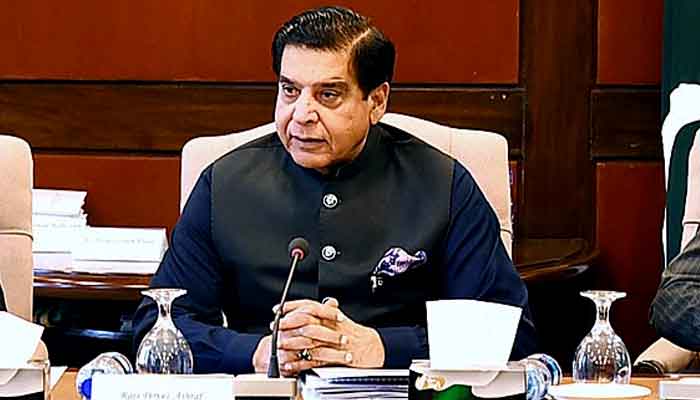Furore whether I accept resignations or not: NA speaker
"I still want those whose resignations were not accepted to come to the assembly," says Raja Pervez Ashraf
ISLAMABAD: National Assembly (NA) Speaker Raja Pervez Ashraf defended his decision of accepting the resignations of Pakistan Tehreek-e-Insaf (PTI) assembly members on Thursday, saying that the decision was made after reviewing their statements and verifying their signatures.
He said several PTI members had contacted him to say that they did not want to resign from the NA.
“There is hue and cry in both cases, whether I accept the resignations or not,” he said while talking to the media after addressing the launching ceremony of Gender responsive budgeting report, organised by the Women Parliamentary Caucus (WPC) and Friedrich-Ebert-Stiftung (FES), here on Thursday.
He said a PTI delegation had come to meet him and various MNAs had told the media about tendering of their resignations. He had accepted the resignations of only such members. “Those who satisfied me were the ones whose resignations were accepted,” he claimed.
He said many PTI members contacted him and told him that they were yet to make a decision about resigning from the assembly.
When he was asked if the resignations were accepted in the wake of Imran Khan’s announcement about the possibility of returning to the National Assembly, he rejected the claim, saying the process of approval of resignations had already started. “I still want those whose resignations were not accepted to come to the assembly,” he added.
Earlier, addressing the report launching ceremony, Speaker Raja Pervez Ashraf said gender responsive budgeting was one of the most effective ways to ensure rights to women and meet their needs. He also said legislators in the country had been working to increase women’s participation in the budgeting process and to ensure that gender considerations are integrated into development planning and implementation.
The speaker also appreciated Dr Shahida Rehmani’s efforts to launch the summary paper on ‘gender responsive budgeting in Pakistan’. He said the party he belonged to had been a staunch believer in women emancipation because empowered women make empowered nations.
Dr. Shahida Rehmani, in her inaugural remarks, said that the WPC had been working dedicatedly to institutionalise the gender budgeting process. “This strategy paper is the first step towards the process,” she said.
Niels Hegewisch, Country Director of FES Pakistan, said there was no social justice without gender justice.
Marion Böker, author of the strategy paper, said: “Administrative budgets, such as the one developed by parliament, allocate money to various entities, but not all benefits are distributed equally, and not everyone is affected in the same way if funds are used differently. For example, cuts to healthcare budgets can disproportionately affect women, as care work is typically done by women.”
Dr Elisabeth Klatzer identified the areas where Pakistan needs to take a more gender-inclusive approach to budgeting. “One potential area for achieving greater gender equality is through the agriculture sector,” she said.
-
 King Hospitalized In Spain, Royal Family Confirms
King Hospitalized In Spain, Royal Family Confirms -
 Japan Launches AI Robot Monk To Offer Spiritual Guidance
Japan Launches AI Robot Monk To Offer Spiritual Guidance -
 Japan Plans Missile Deployment Near Taiwan By 2031 Amid Growing Regional Tensions
Japan Plans Missile Deployment Near Taiwan By 2031 Amid Growing Regional Tensions -
 Meghan Markle, Prince Harry Spark Reactions With Latest Announcement
Meghan Markle, Prince Harry Spark Reactions With Latest Announcement -
 Kate Hudson Reflects On Handling Award Season With No Expectations
Kate Hudson Reflects On Handling Award Season With No Expectations -
 6 Celebrities Who Have Been Vocal About Anxiety And 'panic Attacks'
6 Celebrities Who Have Been Vocal About Anxiety And 'panic Attacks' -
 Is This The Future Of Train Travel? Robot Dogs, Drones Are Redefining Public Transit Safety Through China’s New Metro Station Deployment
Is This The Future Of Train Travel? Robot Dogs, Drones Are Redefining Public Transit Safety Through China’s New Metro Station Deployment -
 Sarah Ferguson Seeks Hollywood Backing As Epstein Files Resurface
Sarah Ferguson Seeks Hollywood Backing As Epstein Files Resurface -
 China’s AI Milestone: ByteDance’s Doubao Chatbot Hits 100M Users During Lunar New Year
China’s AI Milestone: ByteDance’s Doubao Chatbot Hits 100M Users During Lunar New Year -
 Think You Know ChatGPT? Here Are 5 AI Levels You’ve Never Seen
Think You Know ChatGPT? Here Are 5 AI Levels You’ve Never Seen -
 Bitcoin Bounces From $62,000 As On-chain Metrics Signal Prolonged Weakness: Here Is Everything To Know
Bitcoin Bounces From $62,000 As On-chain Metrics Signal Prolonged Weakness: Here Is Everything To Know -
 Elon Musk Teases Official Grok CLI For Developers As AI Rivalry With Anthropic Heats Up
Elon Musk Teases Official Grok CLI For Developers As AI Rivalry With Anthropic Heats Up -
 Jennifer Aniston Ready To Walk Down The Aisle Again?
Jennifer Aniston Ready To Walk Down The Aisle Again? -
 Sarah Ferguson’s Plan Now That Andrew Is Thrown Into The Fire: ‘She’s Not Certain She’ll Come Out The Other Side’
Sarah Ferguson’s Plan Now That Andrew Is Thrown Into The Fire: ‘She’s Not Certain She’ll Come Out The Other Side’ -
 ‘The AI Doc’: What AI Leaders Told Daniel Roher Will Keep You Up At Night
‘The AI Doc’: What AI Leaders Told Daniel Roher Will Keep You Up At Night -
 Sarah Ferguson In Hiding As Arrest Fears Grow After Andrew Was Taken Into Custody
Sarah Ferguson In Hiding As Arrest Fears Grow After Andrew Was Taken Into Custody




